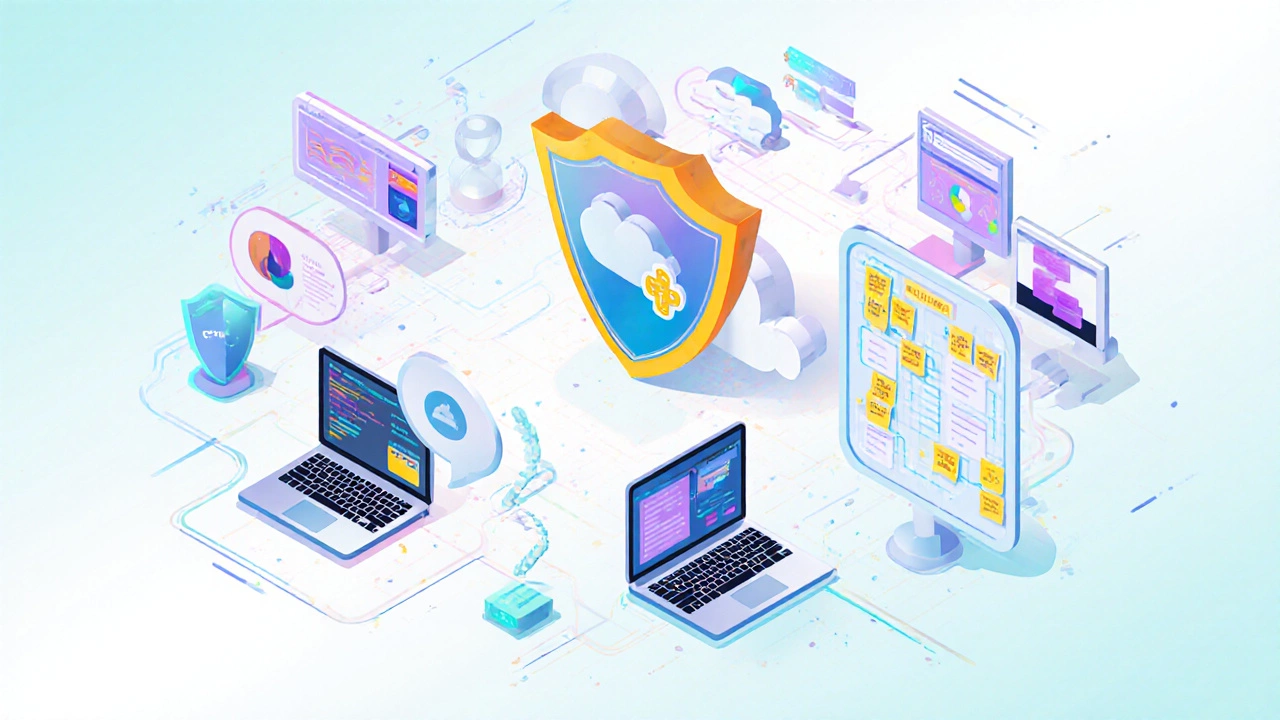
Skill Profitability Calculator
Your Situation
Results
Enter your situation above to see which skills are most profitable for you.
Skills Overview
Here are the 7 high-paying skills we analyzed for 2025. These skills combine strong revenue potential, high market demand, and achievable scalability.
Data Science
Extracting insights from massive datasets using statistics, programming, and machine learning
Cloud Computing
Designing, deploying, and managing services on platforms like AWS, Azure, and Google Cloud
Cybersecurity
Protecting systems, networks, and data from digital attacks
AI Prompt Engineering
Designing effective prompts to get desired outputs from large language models
Product Management
Bridging business, tech, and design to guide a product from concept to market
UI/UX Design
Creating intuitive, visually appealing interfaces that enhance user satisfaction
Blockchain Development
Building decentralized applications and smart contracts on platforms like Ethereum
Ever wondered which skill will actually boost your paycheck instead of just looking good on a résumé? The short answer is that the most profitable skill is the one that marries strong demand with a clear path to mastery. Below you’ll learn exactly how to spot that sweet spot, which seven skills dominate the 2025 market, and a step‑by‑step plan to start earning faster.
What Makes a Skill "Profitable"?
Profitability isn’t just a fancy buzzword-it’s a mix of three measurable factors:
- Revenue Potential: average salary or freelance rates you can command.
- Market Demand: number of open roles, project listings, or gig opportunities.
- Scalability: how quickly you can move from beginner to billable work.
When a skill checks all three boxes, you’re looking at a real money‑maker. The reverse is equally clear: a skill with high demand but a long learning curve may not pay off for years, while a short, well‑paid niche can skyrocket your earnings in months.
Seven High‑Paying Skills Dominating 2025
We’ve sifted through salary surveys, job board data, and freelance platform stats to surface the skills that consistently rank in the top tier. Each entry includes a quick definition, average U.S. salary (global figures are similar after conversion), and why employers are scrambling for talent.
Data Science is the discipline of extracting insights from massive datasets using statistics, programming, and machine learning.
- Average Salary: $135,000 USD
- Demand: 120,000+ postings worldwide per year
- Typical Path: Bachelor’s → Python/R → TensorFlow or PyTorch certification
Cloud Computing covers the design, deployment, and management of services on platforms like AWS, Azure, and Google Cloud.
- Average Salary: $130,000 USD
- Demand: 110,000+ roles annually
- Typical Path: AWS Certified Solutions Architect, Azure Fundamentals
Cybersecurity focuses on protecting systems, networks, and data from digital attacks.
- Average Salary: $125,000 USD
- Demand: 105,000+ open positions each year
- Typical Path: CompTIA Security+, Certified Information Systems Security Professional (CISSP)
AI Prompt Engineering is the craft of designing effective prompts to get desired outputs from large language models like ChatGPT.
- Average Salary: $115,000 USD (often freelance rates of $100‑$150/hr)
- Demand: exploding freelance gigs, 60,000+ project listings in 2025
- Typical Path: OpenAI certification, hands‑on prompt labs
Product Management bridges business, tech, and design to guide a product from concept to market.
- Average Salary: $120,000 USD
- Demand: 95,000+ listings globally
- Typical Path: Pragmatic Institute Certified Product Manager, real‑world product projects
UI/UX Design creates intuitive, visually appealing interfaces that enhance user satisfaction.
- Average Salary: $110,000 USD
- Demand: 80,000+ openings annually
- Typical Path: Nielsen Norman Group UX Certification, portfolio development
Blockchain Development builds decentralized applications and smart contracts on platforms like Ethereum.
- Average Salary: $140,000 USD
- Demand: 70,000+ roles, especially in finance and gaming
- Typical Path: Solidity programming, Certified Blockchain Developer (CBD)
How to Master Each Skill - Realistic Learning Paths
Below is a quick‑start guide for each skill. The timelines assume 10‑15 hours of study per week, a common pace for working professionals.
- Data Science:
- Month 1‑2: Complete an introductory Python for Data Analysis course (e.g., Coursera’s “Python for Everybody”).
- Month 3‑4: Learn statistics and probability (Khan Academy or edX).
- Month 5‑6: Hands‑on machine‑learning with Kaggle competitions.
- Month 7‑8: Earn a specialization certificate (e.g., IBM Data Science Professional Certificate).
- Cloud Computing:
- Month 1: Study cloud fundamentals (AWS Cloud Practitioner).
- Month 2‑3: Pick a track - Solutions Architect or DevOps - and finish the associate‑level exam prep.
- Month 4‑5: Build a portfolio of real‑world projects (migrate a small app to the cloud).
- Cybersecurity:
- Month 1‑2: Complete CompTIA Security+ (free videos + practice exams).
- Month 3‑5: Join Capture‑the‑Flag (CTF) platforms like Hack The Box to gain practical hacking skills.
- Month 6‑7: Pursue an advanced cert (CISSP or CEH) if you aim for senior roles.
- AI Prompt Engineering:
- Week 1: Read OpenAI’s prompt design guide (free).
- Week 2‑3: Experiment with ChatGPT Playground, documenting effective patterns.
- Month 2: Take a short certification (e.g., Prompt Engineer Nanodegree) and build a freelance portfolio on Upwork.
- Product Management:
- Month 1: Read “Inspired” by Marty Cagan (free PDF or library).
- Month 2‑3: Complete a product‑management bootcamp (e.g., Product School).
- Month 4‑6: Lead a small product (scratch‑built app or community project) to showcase outcomes.
- UI/UX Design:
- Month 1: Learn design fundamentals (FreeCodeCamp’s UI Design track).
- Month 2‑3: Master tools - Figma, Sketch - with project‑based tutorials.
- Month 4‑5: Complete a UX certification and assemble a portfolio of 3-4 case studies.
- Blockchain Development:
- Month 1: Understand blockchain basics (IBM’s free blockchain fundamentals).
- Month 2‑3: Learn Solidity via CryptoZombies or Coursera’s “Smart Contracts”.
- Month 4‑5: Build and deploy a dApp on a testnet, then add the project to a GitHub portfolio.

Cost vs. Return - Quick Comparison Table
| Skill | Avg. Salary (USD) | Global Demand (Annual Jobs) | Typical Certification | Learning Investment (USD) | Time to Proficiency |
|---|---|---|---|---|---|
| Data Science | 135,000 | 120k+ | IBM Data Science Professional Certificate | 1,200 | 8 months |
| Cloud Computing | 130,000 | 110k+ | AWS Solutions Architect - Associate | 1,000 | 6 months |
| Cybersecurity | 125,000 | 105k+ | CompTIA Security+ | 950 | 7 months |
| AI Prompt Engineering | 115,000 (freelance rates $100‑150/hr) | 60k+ | OpenAI Prompt Engineer Certification | 400 | 2 months |
| Product Management | 120,000 | 95k+ | Pragmatic Institute Certified PM | 1,300 | 9 months |
| UI/UX Design | 110,000 | 80k+ | Nielsen Norman Group UX Certificate | 1,100 | 7 months |
| Blockchain Development | 140,000 | 70k+ | Certified Blockchain Developer (CBD) | 1,500 | 9 months |
Choosing the Right Skill for You - A Practical Checklist
Use this quick list to see if a skill fits your personal situation.
- Career Stage: Early‑career professionals may favor faster‑to‑proficiency skills like AI Prompt Engineering. Mid‑career folks might invest in higher‑complexity paths such as Data Science or Cloud Computing.
- Interest & Strengths: Do you love puzzles (Cybersecurity) or storytelling (UI/UX)? Passion keeps you learning when the material gets tough.
- Geographic Market: In the UK, Cloud and Cybersecurity roles are booming; in Asia, Blockchain development is soaring.
- Financial Buffer: Some certifications cost over $1,000. If cash flow is tight, start with free resources and upgrade later.
- Time Availability: Allocate a realistic weekly study block. The table above shows typical time to proficiency.
Score each factor from 1‑5, add them up, and the highest total points to the skill that aligns best with your reality.

Common Pitfalls & How to Avoid Them
Even the most promising skill can stall if you fall into these traps:
- Skipping Fundamentals: Jumping straight into advanced courses leaves gaps. Always master the basics first.
- Learning in Isolation: Solo study works, but building a portfolio or contributing to open‑source projects proves you can apply knowledge.
- Chasing Trends Blindly: Not every hype skill lasts. Look for industry‑wide adoption (e.g., cloud, AI) rather than one‑off buzzwords.
- Neglecting Soft Skills: Communication, problem‑solving, and teamwork amplify technical value. Pair your learning with a soft‑skill course.
- Underpricing Freelance Services: When you start freelance, set rates based on market averages, not just “I’m new.” Use the salary data as a benchmark.
Mini‑FAQ - Answers to Your Burning Questions
Which skill gives the fastest ROI?
AI Prompt Engineering typically returns the quickest ROI because you can start freelancing after a few weeks of focused practice, and rates are already strong on platforms like Upwork.
Do I need a degree to enter data science?
A formal degree helps but isn’t mandatory. A solid portfolio of Kaggle projects, a recognized certification, and proven Python skills can land you a junior data‑science role.
How much should I budget for a cloud certification?
Expect $200‑$400 for the exam plus $200‑$300 for study materials. Many employers reimburse the cost after you pass.
Is blockchain still a good career move in 2025?
Yes, especially in finance, supply‑chain, and gaming. Demand is lower than cloud, but salaries are higher, so the trade‑off is worth it if you enjoy cryptography.
Can I combine multiple skills for a bigger paycheck?
Absolutely. A data‑science background paired with cloud expertise (MLOps) commands premium rates, as does UI/UX design with product‑management experience.
Bottom line: the most profitable skill is the one that matches market demand, pays well, and fits your life. Use the data, follow the learning paths, and keep building proof points. In a few months you’ll see the difference in your bank account and your confidence.
